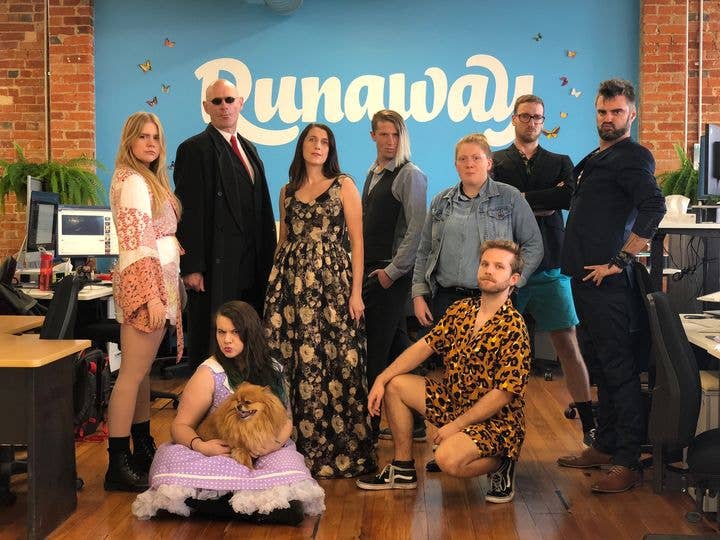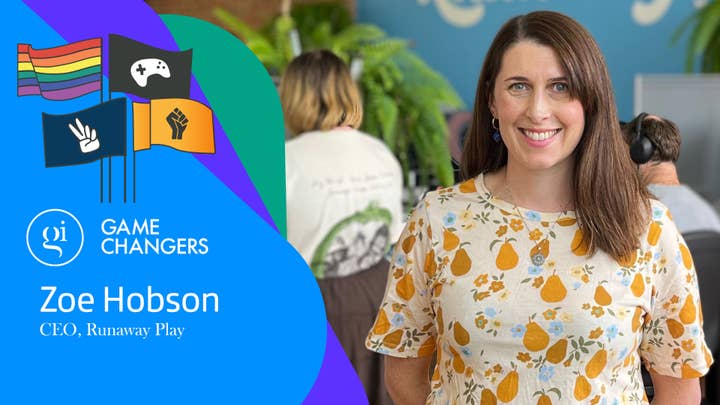Game Changers | Zoe Hobson, Runaway Play
The leader behind the #girlsbehindthegames and 'Walk the Runaway' campaigns discusses the need for more women in leadership positions
Sign up for the GI Daily here to get the biggest news straight to your inbox
GamesIndustry.biz Game Changers is a series of profiles on the groups and individuals going the extra mile to make the games industry a better place. These interviews encompass folks from around the world helping to improve conditions and attitudes towards diversity, equity, inclusion, accessibility, mental health and more. You can read more Game Changers interviews here.
Zoe Hobson does a lot in her day-to-day life, covering many roles, including being a mother to two children and the CEO of Runaway Play, a studio that creates meaningful games aimed at making everyone more aware of the world around us.
The games industry has been around for decades but too often girls are forgotten, or even worse, excluded from the creation, enjoyment, and conversations around games. This imbalance has motivated many of Hobson's efforts over the years.
The prime example is her role in the creation of #girlsbehindthegames, a social media hashtag that encouraged companies to showcase the talented women on their teams or for individuals to speak about their accomplishments.
"We hoped to reach a couple people but instead we reached millions"
#Girlsbehindthegames achieved over five million tweet impressions around International Women's Day 2018 and continued to highlight women across the industry in the years that followed. Hobson tells GamesIndustry.biz she had no idea the campaign would become as big as it has.
"We thought… a couple retweets… that will be enough, you know? Maybe … hopefully it will reach a couple people that are thinking about getting into game dev.
"We were coming up on International Women's Day and thought it would be fun to do a thing on Twitter, to highlight and change the perception. There's been [damage and perception] from gamergate [and] we're just in a good position [as a] female studio. [We thought], 'let's highlight the people we have to let people see the women working in games."
A member of the Runaway team, Leanne Ross, even wrote to the Prime Minister of New Zealand, Jacinda Ardern, and the studio was delighted when she not only wrote back but attended one of the campaign's events.
"Things just went nuts," Hobson recalls. "Companies wanted to get involved. Twitter takeovers. Google got involved. Individual people started sharing how #girlsbehindthegames had impacted them."
The Runaway Play CEO shares one particular story, in which a woman wrote to her saying, "I had given up on games as a career but after reading this, I'm going to get out there."
"We hoped to reach a couple people but instead we reached millions," Hobson adds.

Meanwhile, Hobson has also tried to spark discussion with Runaway Play initiatives such as 'Walk the Runaway,' a celebration of game developer fashion in which the studio's employees shared photos of their day-to-day outfits. The aim was to show that anyone could pursue a career in the games industry.
"Walk the Runaway was literally just a fun thing we started to change the perception of what a game dev looks like," Hobson tells GamesIndustry.biz. "We learned what the perception was and we really wanted to try to change that."
Hobson was keen to encourage more companies to do what Runaway Play is doing, speaking about the importance of "highlighting visibility" and that "if we have the opportunity to have a representative for the company highlight underrepresented people, then we absolutely will."
"If we want to make games for a global audience, which every publisher and developers says they want to do, we should be better at questioning internal bias"
Over the course of her career, Hobson has worked in many jobs, including everything from digital marketing to film production, but she carries her empathy and drive to make things better everywhere she goes.
She talks a lot about how sexism and misogyny, two artificially constructed concepts, interrupt daily life for women, in life and at work –atmospheric conditions that, until significant changes are made, women will continue to deal with. A big part of fixing this comes from pushing for more representation in leadership.
"A lot of the things we've worked with at Runaway Games come from a place of asking what makes sense," Hobson says, before talking about how much more open we all need to be in hearing the ideas and perspectives of everyone around us.
We talked about her leadership style and the importance of including women in the conversation. When she started at Runaway Play, one of the first things she did was look around the company, and the industry, to take an assessment of what needed to be done.
Hobson says she looked around and thought, "Huh, other people aren't really hiring a lot of women. We should talk about that to try to get more people doing that."
This ushered in actions at Runaway Play to do the very same, which has led to the point where 45% of the company's staff are women.
"One of the first things I did [after becoming CEO] was check the pay to make sure there were no gender pay gap issues," Hobson says.
She also shared her approach during our conversation, which extends past Runaway Play and into other parts of her professional life.
"It's important to hire more women and people from diverse backgrounds but also to encourage them to talk about their experiences… and in leadership roles as well. I try to promote women and diversity on a number of the boards I serve on, including whenever I leave. I try to make it really clear, like, 'I'm leaving this spot but it's very important that another woman take my place.'"
Hobson believes that things can only get better for women and marginalized people if they're included in leadership positions and on boards of directors, representing marginalized experiences that would otherwise be ignored or simply forgotten by the others. She emphasises that everything in a company shapes its culture and attitudes.
"It's those small decisions that add up that create the culture, and they grow it, and support it."
"If I see another cutesy woman character with lipstick and beauty marks, I'm gonna scream"
Hobson also tells us about her two children, including her non-binary child, who uses they/them pronouns, and how they pushed in their own way to make the world around them better. She shares how they came home distraught from school one day over the treatment of all the girls in their class.
They said the teacher was making the girls all wear skirts for something while the boys were all to wear pants. They told their mother how this "sends a message that all girls have to be pretty" and that "girls are much more than that." That night they wrote a note to the teacher, which Hobson helped type and print out, calling into question not just dress but gender roles, saying: "We are strong. We are independent. We are more than pretty."
Meanwhile, Hobson's youngest daughter told her how when she grows up she "wants to be the Prime Minister."
Hobson's own efforts in fighting for equality stem from her own childhood. Her parents raised her to be very aware of the lines that society tries to draw, particularly in racism, often using events to illustrate how different this world was toward BIPOC communities, such as the Brixton Riots. Hobson's parents immigrated to New Zealand just before she was born, and she started learning everything she could about the country and its history.
It was troubling when she was growing up, learning from her parents how the Māori people were treated. As a little girl, it bothered her greatly when she learned the Māori language wasn't a required language or really even encouraged in school. She made sure to not only learn it but also as much as she could about the people whose land she was living on. "Although I'm not Māori, I feel like it opened the door and gave me the ability to see the world more, seeing other experiences and learning what was happening," she says.
"The school that I was at didn't offer Māori as a subject and I just thought, 'This should be a proper subject! Why aren't we learning and embracing this language?'"
Hobson made sure to learn the language when she had the opportunity to do so when she was a teenager, feeling it was really important to know the language, but also that people should want to learn it.
"I maybe had a bit of a rebellious streak," she laughs. "I wanted to show that people did want to learn the language."
She carried this fascination with her into her professional life as well, which led to a job in subtitling for Māori television. Hobson had spent so much of her time studying Māori history and the language so this job was incredibly fulfilling for her.

Hobson has done so much to carry herself as a person that tirelessly fights for and demands change, but she cannot change the industry alone and encourages other companies to think about what they can do to help.
"What I wish would happen is more diverse hiring in leadership positions," she says. "That's number one [because] it flows to so many other things. [We also need to address] the lack of women in leadership [and] the lack of action in diversity. IT's one thing to talk about it and say what we should do but it's also about being treated well and being made to feel welcome."
She says that it's also not just in the creation of games and how people in the industry are treated. These attitudes and lifting beliefs need to extend into the games themselves, too.
"If I see another cutesy woman character with lipstick and beauty marks, I'm gonna scream. I don't want to be depicted in that way."
Then there are the arguments women often have to have behind the scenes, at any job, just to keep things on track and moving sometimes, and how much easier everything could be if their experiences and ideas were equally valued. Hobson says this is yet another thing that can be fixed when women and marginalized people are hired and put in positions.
"Women and marginalized people are so good at questioning their internal biases, and that's something the games industry needs more of," she explains. "And if we want to make games for a global audience, which every publisher and developers says they want to do, we should be better at questioning that internal bias."
If you know someone who deserves a Game Changers profile, why not nominate them by emailing gamechangers@gamesindustry.biz?

